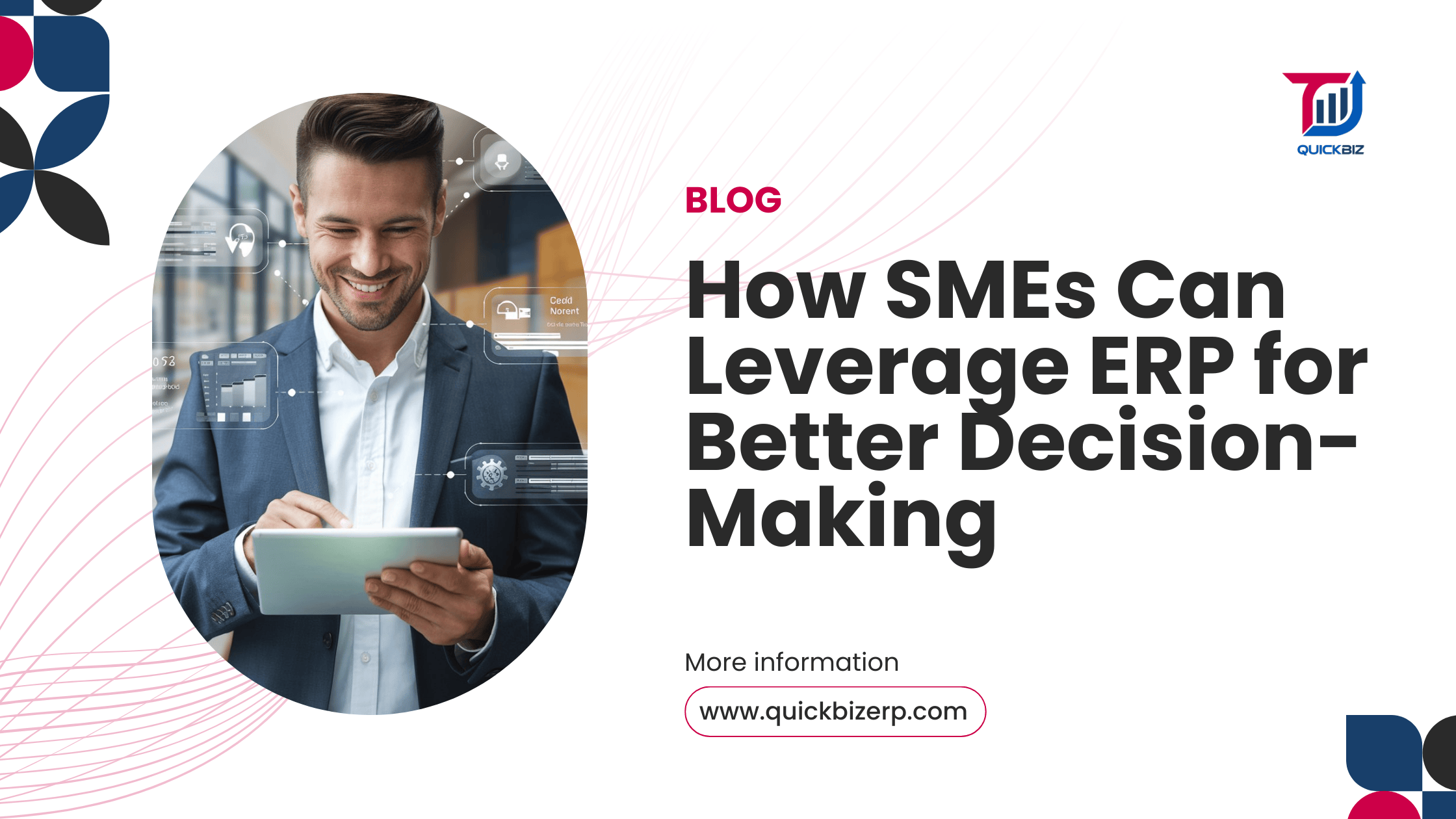How SMEs Can Leverage ERP for Better Decision-Making

Introduction
In today’s fast-paced and competitive business environment, small and medium-sized enterprises (SMEs) face increasing pressure to make quick and informed decisions. Yet, many struggle due to fragmented data and a lack of real-time insights, often leading to inefficiencies, missed opportunities, and errors.
Accurate, real-time data is no longer just a competitive advantage—it’s a necessity. This is where Enterprise Resource Planning (ERP) systems step in as a game-changer. By consolidating data across all departments, ERP solutions provide SMEs with a centralized platform to make data-driven decisions that propel growth. In this blog, we will explore the common decision-making challenges SMEs face and how ERP systems can help overcome them.
The Challenges SMEs Face in Decision-Making
1. Data Silos Across Departments
For many SMEs, data is scattered across different departments and stored in isolated systems, such as spreadsheets or disconnected software tools. This fragmentation makes it difficult to get a holistic view of business operations, leading to inefficiencies and misinformed decisions.
2. Lack of Real-Time Insights
Without real-time data, SMEs often rely on outdated information when making critical decisions. This delay can result in missed opportunities, slower response times, and an inability to adapt to market changes effectively.
3. Inaccurate or Incomplete Information
When data is manually compiled or pulled from disparate systems, the likelihood of errors increases. Incomplete or inaccurate information can lead to flawed strategies, negatively impacting business outcomes.
How ERP Systems Help SMEs Make Better Decisions
a) Centralized Data Management
ERP systems integrate data from all departments into a single platform, eliminating silos and providing a unified source of truth. This ensures that business leaders have real-time visibility into operations, from inventory levels to financial performance, enabling better-informed decisions. Explore the key stages of ERP implementation for a deeper understanding of this process.
b) Enhanced Data Analytics
Modern ERP systems come equipped with advanced analytics tools that turn raw data into actionable insights. SMEs can identify trends, uncover inefficiencies, and make proactive decisions to improve outcomes. Predictive analytics can also help forecast future scenarios, allowing businesses to stay ahead of the curve. Learn how to simplify analytics in this blog on optimizing ERP systems.
c) Improved Forecasting and Planning
ERP systems enhance demand forecasting by analyzing historical data and current trends. SMEs can better manage inventory, avoid stockouts, and reduce excess stock. Additionally, scenario-based planning features allow businesses to evaluate the potential impact of different strategies before implementation. Discover the benefits of demand forecasting and how to use it effectively.
d) Faster Decision-Making
By providing access to real-time data, ERP systems significantly reduce the time required to gather and analyze information. Routine processes are automated, freeing up time for decision-makers to focus on strategic initiatives and respond quickly to challenges or opportunities. Read more about streamlining operations with ERP.
Key Benefits of ERP for SMEs
1. Improved Efficiency and Productivity
ERP systems streamline workflows and automate repetitive tasks, allowing employees to focus on higher-value activities. To learn about the hidden benefits of ERP, explore top 10 benefits for SMEs.
2. Better Financial Management and Cost Control
With accurate financial data and tracking tools, SMEs can monitor expenses, identify cost-saving opportunities, and ensure profitability. Check out key differences between ERP and accounting software for deeper insights.
3. Enhanced Agility in Responding to Market Trends
ERP systems enable SMEs to adapt quickly to changes in customer demand, supply chain disruptions, or market conditions, giving them a competitive edge. Learn more about how digital transformation enhances agility.
Tips for SMEs to Maximize ERP for Decision-Making
1. Select an ERP System That Aligns with Business Needs
Choose a solution that is tailored to your industry and scalable to accommodate future growth. Evaluate features like analytics, customization, and ease of integration.
2. Train Staff to Use ERP Tools Effectively
Invest in training programs to ensure employees understand how to use the system and extract the most value from its features.
3. Leverage Analytics Features for Actionable Insights
Make full use of the analytics and reporting tools to track key performance indicators (KPIs), identify trends, and make data-driven decisions.
Conclusion
Decision-making is the cornerstone of success for SMEs, and ERP systems provide the tools needed to make those decisions with confidence and precision. By centralizing data, enhancing analytics, and streamlining operations, ERP systems empower SMEs to overcome common challenges and unlock new opportunities for growth. Adopting an ERP system is not just about staying competitive—it’s about thriving in an ever-changing business environment. Take the leap today and equip your business with the tools it needs to make smarter, faster, and more effective decisions.

